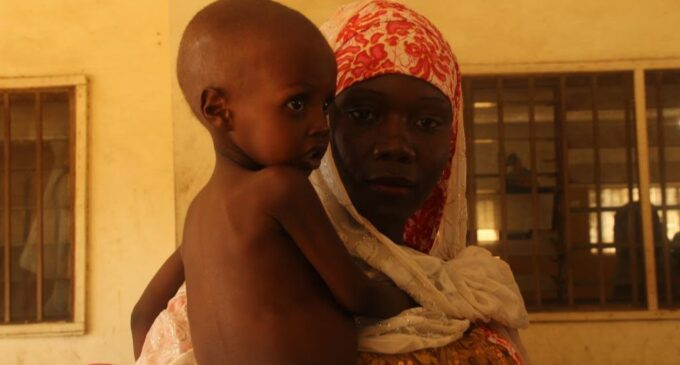Nigeria’s future at the mercy of child malnutrition

The seemingly hopeless situation in which 34-year-old Mallama Hajaratu Mohammed found herself at the Yan’Awaki Health Centre, Kano recently sums up the issue of child malnutrition in Nigeria. Her three-year-old son, Saidu, could neither walk nor eat alone and could do just nothing without being aided.
She had noticed that Saidu was underweight for his age, especially when compared with other children that were his mates. But she had thought her son was only troubled by a normal ailment that would be cured with time. She tried to apply local herbs in bathing him several times because such herbs had been proved to help children grow well. But when Saidu’s condition did not improve satisfactorily, she was left with no option but to take him to the health centre for proper care.
Ignorance had robbed Hajaratu of the knowledge required in making her child get a proper diet that should save him from malnutrition. Yet, there are many mothers across Nigeria in her category as depicted by the many children that range from age 0 to 5 needing urgent nourishing care at several health centres in the country, being vulnerable to disease and death.
According to UNICEF, the first 1,000 days of any child have been discovered to be vital. UNICEF counsels that a child must enjoy exclusive breastfeeding for at least 180 days, which totals six months, to put the child on a sound footing in the journey of life in order to be free from life-threatening ailments while enabling the brain to function optimally, in addition to making the child to ultimately contribute meaningfully to the society.
It is either the mothers have not been breastfeeding their children adequately during the first six months or have been giving the babies only water which could only disrupt their proper growth, resulting in stunting.
Nigeria has the second-highest burden of stunted children in the world, with a national prevalence rate of 37 percent of children under five years of age. An estimated 2.3 million children in Nigeria also suffer from Severe Acute Malnutrition (SAM), although research shows that only two out of every 10 children affected are accessed to treatment.
Over the last four years, there have been campaigns that bear gripping messages as the following: ‘Investment in child nutrition saves children and reduces poverty in adulthood’, ‘Research has shown that in Africa for every dollar invested in child nutrition, there is a return of $16 dollars on investment’, ‘Women empowerment improves the nutritional status of children’, ‘With just N22,000, you will save a child on the brink of death. Support efforts to end malnutrition in the north-east’, ‘Save the lives of children in the north-east, say no to violence, promote food and nutrition security’, ‘A malnourished child is everybody’s burden. Let’s all join hands to save Nigeria’s future. Think Nutrition, Save the future!’, ‘Insurgency fuels malnutrition, malnutrition destroys our future. End the insurgency’, and ‘Do you know that Nigeria’s GDP will worsen if malnutrition in the north-east is not stopped?’ All these are targeted at a secure future for Nigeria.
Prevalence of undernourishment also rose from 7.1 percent (from 2004 to 2006) to 14.6 percent (from 2018 to 2020). All this leaves Nigeria with a future bereft of human capacity in various fields of endeavour as millions of malnourished children would have suffered wasting, stunting, underweight, and deficiencies in vitamins and minerals.
Educating the mothers on particularly breastfeeding babies could prove the key to saving Nigeria from future dangers arising from child malnutrition. However, it can also be hazardous. According to a Kaduna-based medical practitioner, Dr. Mustapha Alkali, “health workers in various Nigerian communities, especially in the north-east and north-west, contend with several challenges ranging from religious to cultural. Added to this is the insurgency in the northeast which bars health workers from reaching out to mothers that need education on child nutrition.” Of course, the high food insecurity and loss of livelihood as well as limited dieting diversity also pose no less formidable threat.
Even where education on child nutrition proceeds smoothly, inadequate funding still poses a huge challenge and this has ultimately caused an unmitigated setback for the intervention efforts that have been made by government and aid agencies. For instance, not all funds allocated to wage war on child malnutrition have been released. In some cases, funds have been released at the end of every year while in other cases not been released at all, despite the United Nations having declared 2016 to 2026 as ‘Decade of Nutrition’.
To be fair though, a Nigerian government that is increasingly saddled with several priorities, especially in the north-east in the war against insurgency, still requires about $100million to address child malnutrition that is ravaging the region while UNICEF itself requires over $1billion to tackle the malaise that has left the region with 42.8 percent affliction of the 2.3 million affected children in Nigeria, trailing only the north-west that has the highest rate in the country with 50.4 percent.
From the foregoing, it has become imperative for Nigeria’s private sector to get involved in the effort to reduce child malnutrition to the barest minimum in the country. Strategically, the private sector is well placed to complement the government in funding. However, the advocacy on this particular subject should be launched and sustained by the media to drive the message home in the most effective way.
A recent two-day media dialogue in Enugu, organised by the Child Rights Information Bureau of the Federal Ministry of Information and Culture in collaboration with UNICEF, dwelt extensively on Child Rights under the Sustainable Development Goals.
Dr. Chidiebere Anthony Ezinwa of the Mass Communication Department at Enugu State University, who delivered a paper titled ‘Sustainable Development Goals (SDGs) as Child Rights’, said Nigeria was ranked 160th on the 2020 world’s SDG index from 159th in 2019, signifying a reversal resulting from non-implementation of measures that aim at guaranteeing child rights in the country. “SDGs cannot be realised without fulfilling the rights of children. Embedded in each of the SDGs are several rights of children to be fulfilled without which no progress would be made in achieving the SDGs. Children are not just objects who belong to their parents and for whom decisions are made, or adults in training. Rather, they are human beings and individuals with their own rights,” said Ezinwa, even as he emphasised on ’Zero hunger’ among the listed Sustainable Development Goals. He also called on the media to constantly urge the government and other relevant agencies in Nigeria on the need to implement all rights due to children in the country without further delay.
Nkeiruka Nwelum, Nutrition Officer at UNICEF Nigeria Country Office, who also presented a paper titled ‘Child malnutrition situation in Nigeria: an overview’, harped on the importance of nutrition to the health of a country’s future while saying Nigeria is “off track” in the pursuit of ‘Zero hunger’ in the SDGs. She also stressed the benefits of good nutrition on the economy and general well-being of the country and tasked journalists in the media dialogue to use their vast networks to ensure that the provisions in the Child Rights Act are implemented in the overall interest of the country in the short term, spotlight issues on child malnutrition as they arise, shape preferences, educate consumers on the need for proper dieting and hold all stakeholders accountable.
















There are no comments at the moment, do you want to add one?
Write a comment